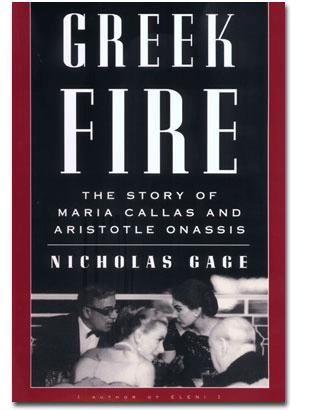
|
Greek Fire: The Story of Maria Callas and Aristotle Onassis |
||||
Gage's book has received excellent reviews from many sources and readers, a few of which we will cite because of the ease with which readers may consult these on the Internet: Richard Dyer, "Onassis-Callas Myths Burn Up in 'Greek Fire,'" review of Greek Fire by Nicholas Gage, The Boston Globe, 23 October 2000; Sally Bedell Smith, "The Diva and the Tycoon," review of Greek Fire by Nicholas Gage, The New York Times on the Web, 5 November 2000; Janet Maslin, "A High-Rent Romance Full of Mythic Minutiae," review of Greek Fire by Nicholas Gage, The New York Times on the Web, 9 November 2000; Maria C. Bagshaw, review of Greek Fire by Nicholas Gage, Library Journal (June 2000); and Aristotle Christou, review of Greek Fire by Nicholas Gage, "Customer Reviews" section of Barnes & Noble.com, 9 February 2001. The author details this romance from its incipient moments aboard the luxurious yacht Christina, through the marriages of both celebrities, up to their deaths. He carefully refutes some claims of earlier biographers and reporters with new evidence uncovered during his research, presenting readers with a substantiated picture of their tempestuous and lasting love affair. Not content to repeat the impressions -- or mistakes -- of previous writers, Gage has gone back to original sources for this story. A number of key employees, close friends, and relatives have shared their personal recollections and memorabilia with Gage, some of them for the first time ever, to shed new light on this enduring relationship. Touching the innermost thoughts of Callas, Gage has reproduced some of her letters and interviews for dramatic impact and so that readers can more fully understand her anguish.
And during another recorded interview with Schaeffer, she talked about her wish to have a baby:
But sadly enough, her greatest wish never fully materialized. Although Terrence McNally had immortalized her pregnancy and reported abortion in his play Master Class, one of Maria's closest employees, Ferrucio Mezzadri, her butler, came just short of refuting McNally's version when confronted by Gage with some evidence suggesting that Maria had given birth by Caesarian in her eighth month to a baby boy who died shortly afterward. Here Gage is at his best, putting all of his investigative skills to work. For Greek American readers the book will hold special appeal, since many followed the lives and careers of both celebrities. Callas and Onassis were -- and still are -- icons of ethnic pride. Their careers and individual biographies have been repeatedly investigated and reported by writers, but in Gage's Greek Fire we see for the first time a dual account dealing principally with the romance between them. It is their love affair which elevated their celebrity status and which so interested the world. But with Gage's rendering of their love affair, Greek-Americans, particularly, will recognize the futility of the Onassis marriage to Jacqueline Kennedy. She never understood or loved Aristotle Onassis as Maria Callas did. Maria's Greek heart and temperament were as passionate as Aristotle's. The result? Greek Fire, as Gage has so aptly titled his book. Nicholas Gage, a former investigative reporter for the Wall Street Journal, is the author of six previous books: Eleni, Hellas, A Place for Us, Greece: Land of Light, Bones of Contention, and The Bourlotas Fortune. His native Greece is the subject of half of them, including Eleni, which received the National Book Critics Circle's nomination for best biography, was awarded first prize by the Royal Society of Literature of Great Britain in 1984, was a Book-of-the-Month Club Main Selection, and was made into a motion picture. Mr. Gage lives in North Grafton, Massachusetts, with his wife Joan, who is also a writer. They have three children, Christos, Eleni, and Marina. |
||||
 |

